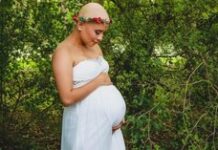Breast cancer is rare in your 20s and 30s, accounting for less than five percent of all cases, but this doesn’t mean that it won’t happen to you.
According to Summit Health, just one in 19,608 women develop breast cancer by the age of 25, but even at a young age, it is still important to know the signs and symptoms to look for.
For Allison Robertson, it took accidentally wearing a bra to sleep to learn of her diagnosis, which ended up saving her mother’s life as well.

When Robertson awoke two years ago at the age of 27, she noticed blood spots on her bra from her right nipple. Her mother, Karen Boyd, advised her to get checked at the OB-GYN to make sure that everything was ok.
When the doctor pressed on her nipple, more blood came out, and a mammogram revealed numerous calcifications in her breasts. If it weren’t for her wearing her bra to sleep, she may have never known that she had stage 1a invasive ductal carcinoma.
Robertson, now 29, received chemotherapy treatments for the tumor and completed them in 2020, but little did she know, this nightmare was not over yet. Robertson’s scary and unexpected breast cancer journey led to her mother’s diagnosis nearly two years later.

After Robertson’s diagnosis, Boyd decided to undergo genetic testing to see if their family had any breast cancer genetic markers. She soon learned that she had the PALB2 gene mutation, making her more susceptible to breast cancer. She had also passed the gene onto both of her children, which explains Robertson’s young diagnosis.
Although Boyd had already been going for her annual mammogram, she started getting checked every three months after learning about her gene mutation. One of her checks, which included an MRI scan, revealed something unusual. She then had a biopsy, which unfortunately came back cancerous. Boyd, now 50, was diagnosed with the same cancer as Robertson – stage 1a invasive ductal carcinoma. She soon began chemotherapy, and will undergo a mastectomy in late October.

“It’s so important to find breast cancer as early as you can!” Boyd wrote in her Facebook group. “I had my MRI in March of 2020, had a mammogram in December of 2020 another MRI in March of 2021! Somewhere between March of 2020 I developed breast cancer that had already spread outside the duct glands when it was found by MRI not mammogram! Had I never had genetic testing my breast cancer would have not been found this year because the mammogram didn’t pick it up!”
With a regular mammogram, Boyd would have never known she had breast cancer, which stresses the importance of genetic testing. Genetic testing becomes even more crucial when you are unsure of your family’s history.
Boyd says she is living proof of how important genetic testing is. “I was able to have an MRI because of my gene,” she told GreaterGood. “I would not know today I had breast cancer because it didn’t show up on my mammogram. It saved my life.”
After undergoing the genetic testing and doing more research, Boyd and her daughter learned that Boyd’s great grandmother and her twin died of breast cancer when they were just in their 20s.

Thanks to Robertson forgetting to take off her bra, along with the genetic testing, both of these women were able to catch their cancer in an early stage. From this point on, all of the women in their family will be tested when they are old enough, which could potentially save more lives.
Boyd has since created the Pink Ribbons Group on Facebook, where she keeps family and friends updated on her journey.
When asked what her advice is for women who have just been diagnosed with breast cancer, she told GreaterGood, “Stay positive and know that this is just a chapter in [your] story. If you have any questions or concerns don’t keep to yourself, ask your doctor. I have a lot of advice in my group that I have learned from asking questions and going thru this back to back.”
![]()
Provide Mammograms
Support those fighting Breast Cancer at The Breast Cancer Site for free! →
Whizzco Source






